ISLAMABAD: There is “no question” of Pakistan being downgraded from a gray to a blacklist by a global financial watchdog this October for failing to curb money laundering and counter-terrorism financing, the prime minister’s top adviser on information said on Tuesday.
Last year, the Financial Action Task Force (FATF) placed Pakistan on a gray list of countries with inadequate terror funding controls. In June, the watchdog said Pakistan had until October to improve its counter-terror finance operations.
If the South Asian nation does not comply with an agreed-upon action plan by then, it could be downgraded to a blacklist, and face sanctions, which would hurt the country’s economy and exports.
FATF will formally announce its decision in Paris after a plenary that starts on October 13. Before that, Pakistan’s steps to fulfil an action plan agreed in June last year will also be reviewed at a meeting in Bangkok, starting September 5
“There is absolutely no question of Pakistan’s degradation to the blacklist,” Dr. Firdous Ashiq Awan, Prime Minister Imran Khan’s Special Assistant on Information and Broadcasting, told Arab News. “Our progress on different fronts to meet the FATF’s requirements is already before the world.”
“We are taking all necessary measures to ensure hundred percent implementation of the FATF’s action plan ... and are quite optimistic to get off the gray list on the basis of our actions in October,” Awan added.
The Pakistan government was following a “multi-pronged” approach to meeting FATF’s requirements, the information adviser said, and had moved to strengthen its laws against money laundering and terror financing, ban militant outfits and choke their sources of financing.
“We have plugged almost all loopholes in our financial system, and new laws [against money laundering and financing terrorism] will be passed by parliament soon,” she said.
Last week, Pakistan’s finance ministry rejected as baseless Indian media reports that Islamabad was put on a FATF black list. India, engaged in a standoff with Pakistan over the disputed region of Kashmir, has pressed for further sanctions against its neighbor.
“We are fully engaged with almost all members of the FATF and our diplomatic efforts will also help counter the Indian propaganda,” Awan said.
According to the 36-nation FATF charter, the support of at least three member states is essential to avoid blacklisting. India – Pakistan’s arch-rival and a co-chair of the joint group of FATF and Asia Pacific Group – has been pushing for Islamabad to be downgraded to the black list.
FATF has asked Pakistan to work on implementing its action plan to address its strategic deficiencies, including by: (1) adequately demonstrating its proper understanding of the TF (terror financing) risks posed by the terrorist groups , and conducting supervision on a risk-sensitive basis; (2) demonstrating that remedial actions and sanctions are applied in cases of AML/CFT (anti-money laundering/counter terrorist financing) violations, and that these actions have an effect on AML/CFT compliance by financial institutions; (3) demonstrating that competent authorities are cooperating and taking action to identify and take enforcement action against illegal money or value transfer services (MVTS); (4) demonstrating that authorities are identifying cash couriers and enforcing controls on illicit movement of currency and understanding the risk of cash couriers being used for TF; (5) improving inter-agency coordination including between provincial and federal authorities on combating TF risks; (6) demonstrating that law enforcement agencies (LEAs) are identifying and investigating the widest range of TF activity and that TF investigations and prosecutions target designated persons and entities, and persons and entities acting on behalf or at the direction of the designated persons or entities; (7) demonstrating that TF prosecutions result in effective, proportionate and dissuasive sanctions and enhancing the capacity and support for prosecutors and the judiciary; and (8) demonstrating effective implementation of targeted financial sanctions (supported by a comprehensive legal obligation) against all 1267 and 1373 designated terrorists and those acting for or on their behalf, including preventing the raising and moving of funds, identifying and freezing assets (movable and immovable), and prohibiting access to funds and financial services; (9) demonstrating enforcement against TFS violations including administrative and criminal penalties and provincial and federal authorities cooperating on enforcement cases; (10) demonstrating that facilities and services owned or controlled by designated person are deprived of their resources and the usage of the resources.
Pakistan says “no question” of being blacklisted by FATF over terror funding controls
Pakistan says “no question” of being blacklisted by FATF over terror funding controls
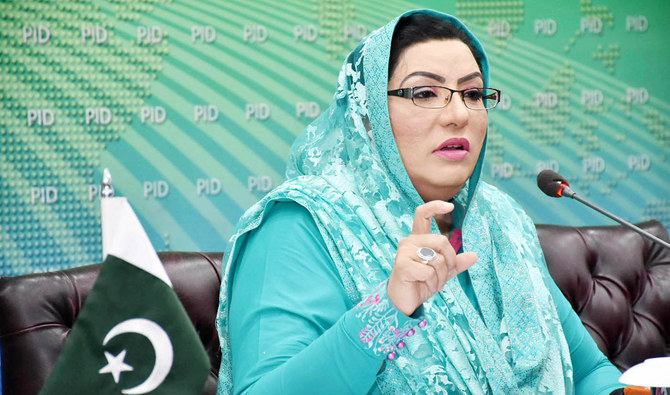
- Taking “all necessary measures” to get off watchdog’s gray list, PM’s adviser on information says
- Pakistan has until October to improve its counter-terror finance operations or face further action, including sanctions
PM Sharif forms committee to address Pakistani wheat farmers’ grievances
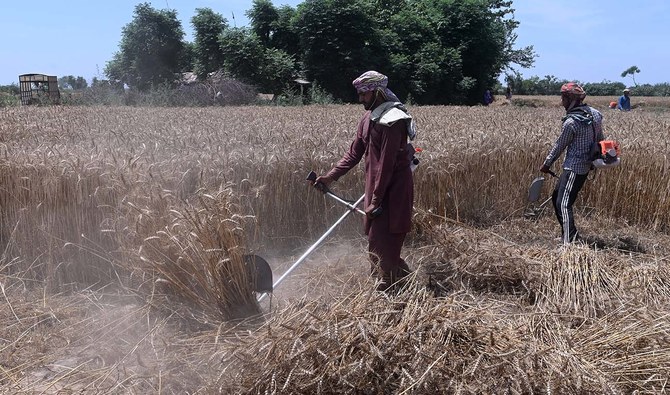
- Farmers are demanding government stop wheat imports that have flooded markets, leading to reduced prices
- Government committee to take measures to address farmers’ complaints within four days, says state media
ISLAMABAD: Prime Minister Shehbaz Sharif this week formed a government committee to address the ongoing wheat crisis in the country, state-run media said, amid protests by thousands of farmers who say they are facing difficulties in selling and buying the food grain in Pakistan.
Farmers in Pakistan’s most prosperous Punjab province are demanding the government stop wheat imports that have flooded the market at a time when they expect bumper crops. The import of wheat in the second half of 2023 and the first three months of 2024 has resulted in excess amounts of the commodity leading to reduced prices, they say.
“Prime Minister Shehbaz Sharif on Saturday taking notice of the issues faced by the farmers in selling their wheat and obtaining wheat bags, formed a committee under Ministry of National Food Security and Research to address their grievances,” the state-run Associated Press of Pakistan (APP) reported.
Sharif issued the directives to form the committee during a high-level meeting he chaired on Saturday to review wheat procurement matters through the Pakistan Agricultural Storage and Services Corporation (PASSCO). The meeting was attended by federal ministers Rana Tanveer Hussain, Attaullah Tarar, and other officials.
The committee would take measures to address farmers’ concerns within four days, APP said, adding that Sharif expressed concerns over reports of farmers facing difficulties in buying wheat at “fair” prices and tasked authorities to resolve the issue immediately.
“The federal government, through PASSCO, is procuring 1.8 million metric tons of wheat to ensure maximum benefit to farmers,” the APP quoted Sharif as saying.
“The prime minister emphasized that the government will not compromise on the economic protection of farmers and will take all necessary steps to ensure their well-being.”
Agriculture is the backbone of Pakistan’s economy and constitutes its largest sector. The majority of Pakistan’s population, directly or indirectly, depends on agriculture for their income.
According to the Pakistan Bureau of Statistics (PBS), agriculture contributes about 24 percent of the Gross Domestic Product (GDP) and accounts for half of the employed labor force in the country.
Pakistan face Korea in Azlan Shah field hockey tournament today

- Pakistan began tournament on winning note after beating Malaysia 5-4 on Saturday
- The 30th edition of the prestigious tournament is being played in Malaysia’s Ipoh city
ISLAMABAD: Pakistan will face Korea in the Sultan Azlan Shah field hockey cup today, Sunday, after beginning the tournament on a winning note a day earlier by beating hosts Malaysia, state-run media reported.
The 30th edition of the prestigious field hockey tournament is being played in Ipoh, Malaysia from 4-11 May. The cup will be contested between six teams, namely Canada, Japan, Malaysia, New Zealand, Pakistan and Korea.
Pakistan’s national hockey team made a triumphant start to the tournament on Saturday, defeating hosts Malaysia by 5-4 in a thrilling match.
“The Pakistan hockey team would face Korea in their second match on Sunday (May 5),” state-run media Associated Press of Pakistan (APP) reported.
Pakistan have the upper hand against Korea as far as the head-to-head record is concerned. The South Asian country has won 14 matches in total against Korea while the latter has won eight. Both teams have drawn with each other six times.
Pakistan’s hockey team came from behind on Saturday to down Malaysia 5-4 to win the contest. Sufiyan Khan, Pakistan’s drag flicker, scored a hat-trick while Zakriya Hayat and Abu Bakar Mahmood contributed one goal each to the team’s victory.
The Sultan Azlan Shah Cup 2024 will see a round-robin stage at first where all six teams will play each other once, followed by positional playoffs.
The teams finishing in the bottom two places of the league stage will contest in a fifth-place classification match. Teams finishing in third and fourth place in the pool stage will compete for bronze, while the top two teams will play in the final for the title.
The match is scheduled to begin at 3:15 p.m. Pakistan Standard Time (PST).
Saudi business delegation to arrive in Pakistan today to explore investment opportunities
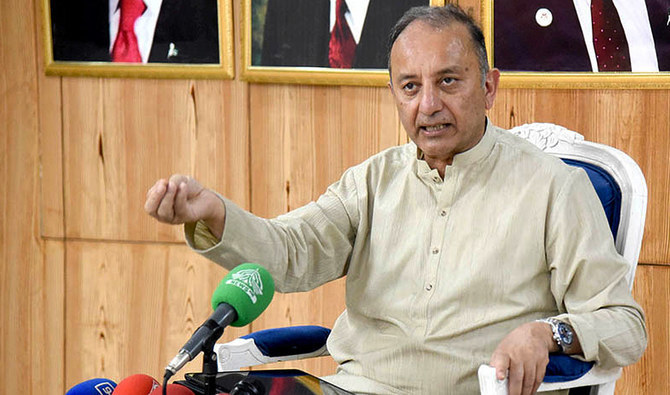
- Saudi deputy investment minister, representatives of 30-35 Saudi companies part of delegation, says Pakistani minister
- Saudi Arabia recently reaffirmed its commitment to expedite investment package for Pakistan worth $5 billion
ISLAMABAD: A high-level Saudi business delegation led by the Kingdom’s deputy investment minister will arrive in Pakistan today, Sunday, to explore investment opportunities in various economic sectors, Federal Minister for Petroleum Musadik Malik confirmed a day earlier.
Pakistan and Saudi Arabia, who enjoy fraternal ties rooted deep in shared culture, religion and economic cooperation, have witnessed a flurry of official visits in recent weeks. Saudi Foreign Minister Prince Faisal bin Farhan traveled to Islamabad earlier in April before Prime Minister Shehbaz Sharif’s two-day visit to the Kingdom to attend a World Economic Forum meeting where he met Saudi officials.
“The Saudi Deputy Investment Minister is visiting Pakistan tomorrow,” Malik, who is also the focal person for Saudi-Pak bilateral collaboration, told reporters at a news conference in Lahore on Saturday.
“He is bringing representatives from 30 to 35 companies whose CEOs are coming here.”
The Pakistani minister maintained his country had always cherished cordial ties with the Kingdom, though it had not managed to turn this “relationship of friendship into a relationship of stability and progress.”
He said Pakistan mostly discussed its financial concerns with the Saudi authorities and requested their support. However, the present government wanted to change that by focusing its bilateral conversations on mutually beneficial progress and development, not aid and assistance.
The minister said the two sides discussed a new refinery project during the recent engagements that would be used for export purposes to earn foreign revenue. Additionally, food security was also discussed to further strengthen Pakistan’s agricultural sector.
He informed that Prime Minister Sharif wanted the country’s “private sector to take the lead on this path to progress.”
“That is why Saudi investors have been invited to come here,” he continued. “They will sit with Pakistani companies and figure out ways to connect the Pakistani talent with the capital and investment needed at the international level for the IT revolution.”
Malik said the bilateral collaboration would primarily benefit small businesses, particularly the technology companies established by young students who were likely to get a significant amount of investment from Saudi entrepreneurs.
He expressed optimism that chemical, energy and agricultural companies would also gain an advantage from the ongoing bilateral collaboration between the two sides.
Apart from Pakistan and Saudi Arabia’s fraternal ties, the Kingdom is particularly important to Islamabad as it is home to over 2.7 million Pakistani expatriates and serves as the top source of remittances to the cash-strapped South Asian country.
Both Pakistan and Saudi Arabia have been closely working to increase bilateral trade and investment deals, and the Kingdom recently reaffirmed its commitment to expedite an investment package worth $5 billion.
Pakistan urges Hajj pilgrims to get vaccinated five days before departure to Saudi Arabia
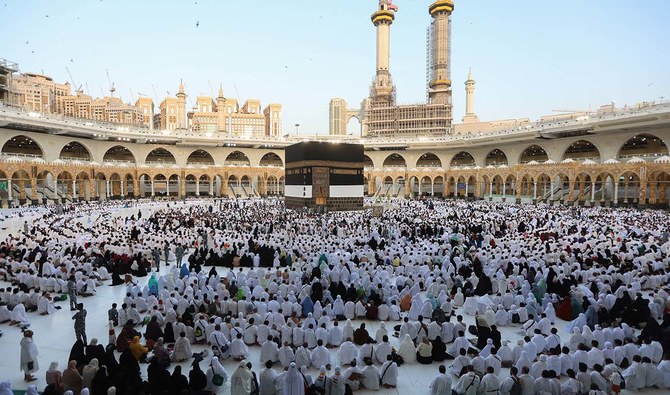
- Pakistani pilgrims require to vaccinate themselves against meningitis, seasonal influenza and polio
- The vaccinations are done at Hajji camps during the day in all major cities around the country
ISLAMABAD: Pakistan’s religious affairs ministry on Saturday asked Hajj pilgrims to get themselves vaccinated at least five days before departure to Saudi Arabia to avoid inconvenience.
Hajj pilgrims must comply with strict vaccination requirements set by the Saudi Ministry of Health to ensure public safety during one of the world’s largest annual gatherings.
Mandatory vaccines include the meningitis shot, with additional recommendations for the seasonal influenza vaccine, while travelers from regions prone to yellow fever and polio must also provide corresponding immunization certificates.
These precautions are vital to prevent the spread of infectious diseases among millions of pilgrims converging in the kingdom from across the globe.
“The intending pilgrims are advised to visit their respective Hajji camps five days (from 9 am to 5 pm) before their flight to receive vaccination against meningitis, seasonal influenza and polio, besides obtaining a yellow card,” the state-owned Associated Press of Pakistan (APP) news agency quoted a statement issued by the ministry.
“This is a mandatory requirement,” it added.
Hajj is one of the Five Pillars of Islam, which include the core beliefs and practices every Muslim is expected to follow.
The pilgrimage is required to be performed at least once in a lifetime by all adult Muslims who meet the necessary conditions of health and financial stability to travel to and perform the rituals in Makkah.
Pakistan plans to launch the special Hajj flight operation from May 9 that will continue until June 10.
Security forces kill six militants in northwest Pakistan
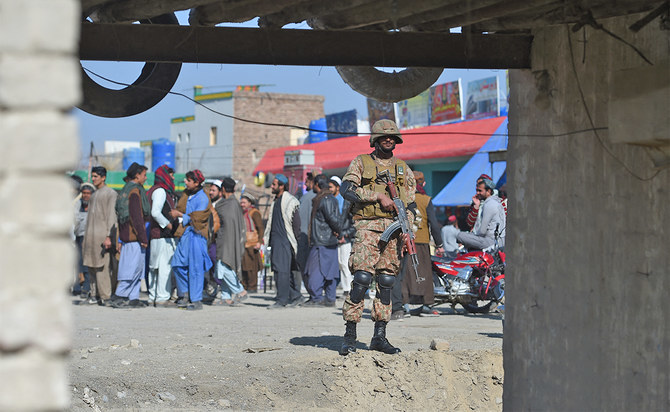
- The intelligence-based operation was carried out in North Waziristan that led to an intense exchange of fire
- The targeted militants were involved in violent attacks against security forces and civilians in the volatile area
ISLAMABAD: Pakistani security forces carried out an intelligence-based operation in North Waziristan tribal district in the early hours of Saturday, killing six militants after a heavy exchange of fire.
Located in the tribal belt along the Pakistan-Afghanistan border, North Waziristan has historically been known as a volatile region with significant militant activity.
The Pakistani military carried out several major operations in the area to dismantle militant networks and had success in reducing violence.
However, there have been reports of renewed militant activities in the region, prompting the Pakistani security forces to once again increase its focus on these challenges.
“On night 3/4 May 2024, security forces conducted an intelligence based operation in North Waziristan District, on reported presence of terrorists,” the military’s media wing, ISPR, said in a statement.
“During the conduct of operation, intense fire exchange took place between own troops and the terrorists,” it continued, adding that six militants were killed as a result.
The statement informed that the security forces also destroyed militant hideout during the operation and launched a “sanitization operation” in the area while trying to locate any remnants of the militant group.
“The killed terrorists remained actively involved in numerous terrorist activities against security forces as well as target killings of innocent civilians in the area,” the ISPR added.










